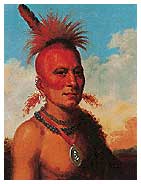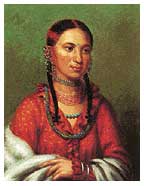|
|
Native American Portraits in the White House Library
Emissaries who visited the mansion in 1822 were painted by Charles Bird King.


On the left, Sharitarish, or "Wicked Chief" of the Pawnee Tribe.
On the right, Hayne Hudjihini, or "Eagle of Delight", of the Oto Tribe. She contracted measles during her visit and died shortly after she returned home.
These paintings, given to the White House in 1962, are King's own copies from a set of eight portraits commissioned in 1821 for the American Indian archives, then located in Georgetown. In 1865, the originals--by then in the Smithsonian Institution--were destroyed by fire.
The federal government, fearing that the powerful and militant tribes of the Great Plains would oppose westward expansion, invited a number of Native American leaders to visit the nation's most important cities and forts and to meet their "Great Father" the President. Government officials hoped to overawe these Indians with an impressive show of military strength, luxurious gifts, and elaborate ceremony.
When the Native Americans arrived in Washington, merchants fitted them out in military finery for an audience with President James Monroe . They were formally received by the President in the Red Room on February 4, 1822. With the help of interpreters, he thanked them for coming, spoke of the white man's strength and the blessing of peace, and offered to send missionaries to instruct them in Christianity and agriculture. The chiefs, impressed but feeling ill at ease in their new clothes, gravely replied that they admired the things they had seen but preferred their own life of trapping bear and hunting buffalo. Sharitarish, their leader, added: "...we have plenty of land, if you will keep your people off it."
Each speaker laid a gift at the President's feet: moccasins, feathered headdresses, buffalo robes, and peace pipes. Before the party moved to the Blue Room for cake and wine, Sharitarish expressed the hope that Monroe would order the presents kept "in some conspicuous part of your lodge, so that when we are gone,...if our children should visit this place, as we do now, they may see and recognize with pleasure the deposits of their fathers, and reflect on times that are past." The gifts were unfortunately lost long ago, and efforts to avoid fighting the Great Plains tribes were unsuccessful.
|
|
|
|
|
 Native American Nations
Native American Nations
